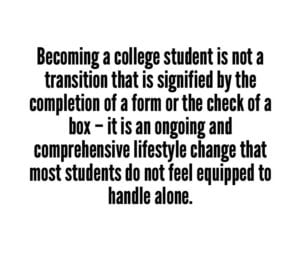Peer Mentors Help College Students Succeed
Carinne Deeds, American Youth Policy Forum
As the first in my family to go to college, I entered the application process with an endless amount of questions. Where should I go to college? Can I even get into college? Where do I find all the necessary forms? What in the world is a FAFSA? Thanks to helpful college counselors at my high school (and after a very long and confusing year of figuring things out by trial and error), I was able to navigate the complicated processes required to get into college. What proved to be even more of a challenge, however, was overcoming my anxieties about actually being a college student before and even after I arrived on campus. What will college life be like? Where should I live? Will I have time for a social life if I also have to work? How and where can I make friends? Will I miss my family? What if I get lonely? What if I’m not cut out for this?
Like many first-generation students, my parents, though they loved and supported me and would have done anything they could to help, were unfamiliar with the complicated processes required to get to and persist through college, as well as the personal skills and resources necessary to not only survive but to thrive as an individual newly embarking into the adult world. Additionally, most of my anxiety about fitting in and being comfortable as a college student could neither be addressed by my parents, nor a high school guidance counselor, nor a university online FAQ page.
 I was fortunate to attend a university that recognized the need students have to receive support outside of the classroom and even beyond traditional college advising. Thanks in large part to peers and mentors I encountered through various university systems and programs, I slowly but surely transitioned from college-aspiring Carinne to college-attending Carinne – a transition that changed the course of my life.
I was fortunate to attend a university that recognized the need students have to receive support outside of the classroom and even beyond traditional college advising. Thanks in large part to peers and mentors I encountered through various university systems and programs, I slowly but surely transitioned from college-aspiring Carinne to college-attending Carinne – a transition that changed the course of my life.
The role of peer advising
Peer mentors* have the ability to connect with students in a way that traditional advisors cannot, either while they’re in high school, in transition, or have already made it to campus. Aside from providing additional guidance on logistical issues like form submission and tuition deadlines, peers have a significant amount of flexibility in terms of both the time and the topic of communication. For example, peer advisors can often maintain regular and ongoing contact with their mentees without being constrained by more formal requirements. Additionally, questions of school culture, community, belonging, and even some questions about navigating university systems are usually questions that students either cannot or do not feel comfortable asking traditional academic advisors. Peers may be more willing and able to help students with more personal concerns such as homesickness, social issues, or academic and personal insecurities, and may also have a deeper level of empathy and understanding of these issues, as they have likely encountered similar experiences themselves.
Research evidence affirms the idea that peer supports are crucial in helping students succeed in college, and that many peer mentoring programs have had positive effects on both mentors and mentees. According to theJournal of College Reading and Learning, mentoring programs can improve the interpersonal, communication, and leadership skills of mentors. Both mentees and mentors can acquire better time management skills and a greater sense of responsibility. The mentees themselves receive many additional benefits, such as self-esteem, goal-setting, and career guidance. Research also indicates that peer mentoring programs can have a positive effect on academic outcomes for mentees.
What does peer advising look like?
The term peer advising generally refers to the traditional one-on-one method of advising, in which an older peer (usually a current or former college student) provides support to a future or current college student – preferably from a similar background as the mentor. It also describes those situations in which current college students can connect with other students in the same or a similar stage of the process. For example, learning communities such as those at CUNY provide current students with a network of peers in a smaller, more personalized setting. Students take classes together, study together, and also have access to counselors, tutors, and other support services. These programs capitalize on the idea that students going through a common experience may be ideally suited to support one another, in addition to receiving supports from caring adults. Peer advising also occurs in a variety of forms at the individual level. As mentioned in a previous blog post, the Urban Assembly’s (UA) Bridge to College Program in New York hires and trains alumni to provide counseling to students with regards to the financial, personal, and logistical difficulties faced during the college transition.
This element of providing a personal connection, whether it be in a one-on-one or a group setting, is a unique benefit of peer mentoring programs and is likely one reason they have been shown to be so effective. As I reflect on my own experience as a first-generation college student, I recognize that without the support I received from my peer mentors and the personal connection I felt to the university because of them, my college experience could have ended much differently.
4 comments on “Peer Mentors Help College Students Succeed”
Comments are closed.
RT @BrettPowellADHE: Peer Mentors Help College Students Succeed https://t.co/NzcRaYel7m via @sharethis
RT @BrettPowellADHE: Peer Mentors Help College Students Succeed https://t.co/NzcRaYel7m via @sharethis
RT @BrettPowellADHE: Peer Mentors Help College Students Succeed https://t.co/NzcRaYel7m via @sharethis
RT @BrettPowellADHE: Peer Mentors Help College Students Succeed https://t.co/NzcRaYel7m via @sharethis